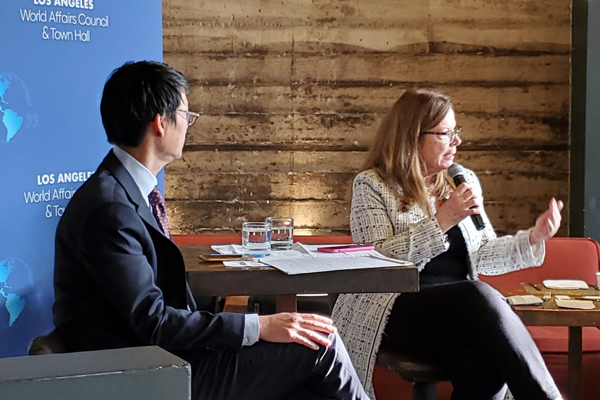
Gene Park, Director of the Global Policy Institute interviews Sheila Smith
The Los Angeles World Affairs Council & Town Hall hosted Dr. Sheila A. Smith, Senior Fellow for Japan Studies at the Council on Foreign Relations, for a breakfast discussion on Japan’s recent steps to remilitarize for the first time since the end of World War Two. The discussion was moderated by Dr. Gene Park, Director of the Global Policy Institute at Loyola Marymount University and expert on Japan’s economy.
Dr. Smith made the point that while Japan’s economic power has grown drastically since post-war reconstruction – and today is one of the world’s strongest and most stable economies – the country’s military and defense capabilities have not grown at the same rate. As part of the treaty to end the War, and rebuild Japan as a democracy, they have been constitutionally banned from having a military. As such, they only have the ability to defend themselves from an outside attack. For example, after the terrorist attacks on September 11th, 2001, Japan joined the international coalition to combat global terror with the job of refueling other countries’ naval vessels. The ships Japan used to refuel their allies were wooden.
Up until recently, there has been no real movement by the Japanese government or public to amend their constitution to allow for a military. But as China has risen in its political, economic, and military influence in Asia and the world, and North Korea has continually tested missiles by launching them over Japan, things have begun to change. Today, Japan has a greater interest in ensuring its own naval and maritime security, especially in the South China Sea and the Sea of Japan.
In addition to China’s rise and insecurity with respect to North Korea, Japanese leaders feel like they can no longer rely on the United States to guarantee their security thanks to rhetoric by President Donald J. Trump. President Trump has said things along the lines of Japan needing to pay the United States if it wants to be protected, or telling them to develop their own nuclear weapons. Though Japan has always covered all of the operational costs for U.S. troops in Japan – from utilities to mechanical upkeep of cars, trucks, and ships – statements like this have struck a chord within the Japanese government and national security apparatus, and the country has taken steps to rearm itself for the first time in 74 years.
